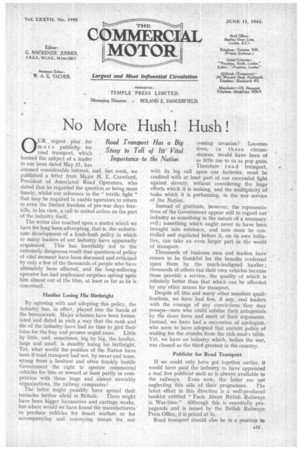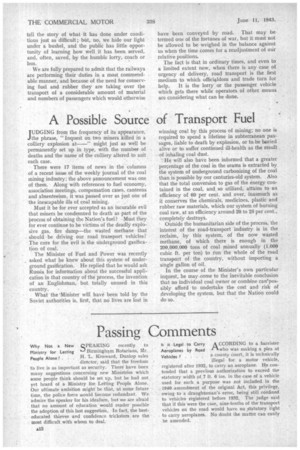No More Hush! Hush !
Page 13

Page 14

If you've noticed an error in this article please click here to report it so we can fix it.
Road Transport Has a Big Story to Tell of Its Vital Importance to the Nation
OUR _ urgent plea: for more publicity for road transport, which formed the subject of a leader in our issue dated May 21, has aroused considerable interest, and, last week, we published a letter from Major H. E. Crawfurd, President of Associated Road _ Operators, who stated that he regarded the question as being most timely, whilst our reference to the " terrific fight" that may be required to enable operators to return to even the limited freedom of pre-war days foretells, in his view, a call to united action on the part of the industry itself, The writer also touched upon a matter which we have for long been advocating, that is. the unfortunate development of a hush-hush policy in which so many leaders of our industry have apparently acquiesced. This has inevitably led to the extremely dangerous result that questions of policy of vital moment have been discussed and criticized by only a few of the thousands of people who have ultimately been affected, and the long-suffering operator has had unpleasant surprises sprung upon him almost out of the blue, at least so far as he is concerned.
Haulier Losing His Birthright By agreeing with and adopting this policy, the industry has, in effect, played into the hands of the bureaucrats. Major schemes have been formu: lated 'and dated in such a way that the rank and file of the industry have had no time to gird their loins for the fray and present solInd cases. Little by little, and, sometimes, big by big, the haulier, large and small, is steadily losing his birthright. Yet, what would the position of the Nation have been if road transport had not, by sweat and tears, wrung from a hesitant and often frankly hostile Government the right to operate commercial vehicles for hire or reward at least partly in competition with those huge and almost unwieldy organizations, the railway companies?
The latter might possibly have spread their tentacles farther afield in Britain. There might have been bigger locomotive and carriage works, but where would we have found the manufacturers ' to produce vehicles for desert warfare or for accompanying and conveying troops for our coming invasion? Locomotives, in these circumstances, would have been of as little use to us as pop guns. Therefore road transport, with its big call upon our factories, must be credited with at least part of our successful fight against slavery, without considering the huge efforts which it is making, and the multiplicity of tasks which it is performing, in the war service of the Nation.
Instead of gratitude, however, the representatives of the Government appear still to regard our industry as something in the nature of a necessary evil ; something which ought never to have been brought into existence, and now must be controlled and regulated before it, on its own initiative, can take an even larger part in the world of transport.
Thousands of business men and traders have reason to be thankful for the benefits conferred upon them by the much-maligned haulier ; thousands of others run their own vehicles because these provide a service, the quality of which is infinitely better than that which can be afforded by any other means for transport.
Despite all this and many other manifest qualifications, we have had few, if any, real leaders with the courage of any convictions they may possess—men who could subdue their antagonists by the sheer force and merit of their arguments. Instead, we have had a succession of apologists, who seem to have adopted that ancient policy of waiting for the crumbs from the rich man's table. Yet, we have an industry which, before the war, was classed as the third greatest in the country.
Publicist for Road Transport If we could only have got together earlier, it would have paid the industry to have appointed a real live publicist such as is always available to the railways. Even now, the latter are not neglecting this side of their programme. The latest effort in this direction is a well-produced booklet entitled "Facts About British Railways in War-time." Although this is essentially propaganda and is issued by the British Railways Press Office, it is priced at 1s.
Road transport should also be in a position to tell the story of what it has done under conditions just as difficult; but, no, we hide our light under a bushel, and the public has little opportunity of learning how well it has been served, and, often, saved, by the humble lorry, coach or bus.
We are fully prepared to admit that the railways are performing their duties in a most commendable manner, and because of the need for conserving fuel and rubber they are taking over the transport of a considerable amount of material and numbers of passengers which would otherwise have been conveyed by road. That may be termed one of the fortunes of war, but it must not be allowed to be weighed in the balance against us when the time comes for a readjustment of our relative positions.
The fact is that in ordinary times, and even to a limited extent now, when there is any case of urgency of delivery, road transport is the first medium to which officialdom and trade turn for help. It is the lorry or the passenger vehicle which gets there while operators of other means are considering what can be done.




















































